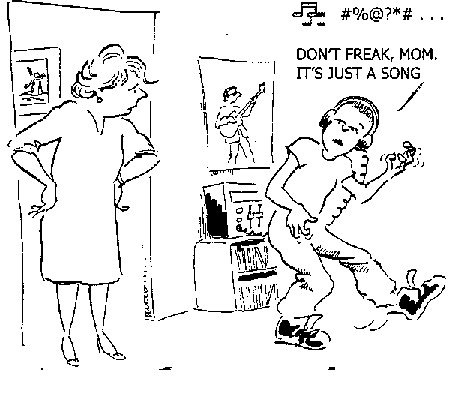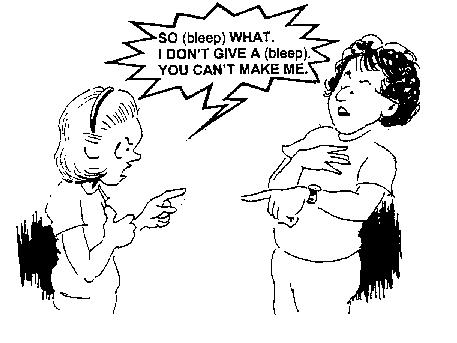“BAD” AND DISRESPECTFUL LANGUAGE It used to be considered developmentally normal for teens to talk back to their parents for the first time when they hit adolescence. Typically when families established that disrespectful or foul language was inappropriate, teens would clean up their language at home, although they would often experiment with cursing or “bad words” around their friends. Most parents today would probably agree that those were the good old days.
Here are some questions asked by parents that may help you answer your own questions. Dear Dr. Sylvia, Our three-year-old son has begun to use foul language. It’s becoming more frequent. We’ve been ignoring him; however, his six-year-old sister now screams out, “MOMMY, Bobby said F--- again!” We don’t know who to reprimand and who to put in time-out. Any suggestions?? Dear Parents of Boy with Foul Mouth, Decisions like this are always harder when several children are involved. For starters, it’s a good idea to determine where your son is learning the language. Is it possible that Big Sister is the one who’s teaching him the words? She seems awfully anxious to get him into trouble, but I guess that’s not untypical for an older sister. Although ignoring the language might have worked if he were alone, it surely is not working now. Try this approach: explain to your son that he’s using bad words and he will have to go to his room for a few minutes. Then follow through immediately. Only a few minutes and a few times should take care of the problem. Remind his sister that you can manage this discipline on your own, and if she reports on her brother, you will follow through and time him out. However, if she uses the bad words when she reports him, both children will go to their rooms. It may help for you to know that sometimes ignoring doesn’t work even with one child, but time-out is usually very effective if you use it consistently. Dear Dr. Sylvia, Should I ignore comments/swearing from my adolescent after I have set limits? Dear Parent of Disrespectful Teen, You can ignore comments, but I suggest you establish a penalty for swearing. A dollar for each time a child swears usually reduces the habit. Tell your adolescent of the plan in advance and keep track in an obvious way. Explain that you believe she can express herself better, and you’d like to help her break the habit. She’ll get the idea when her allowance disappears.
Yes, it’s just a stage, but parents shouldn’t have to accept such an ugly habit. If your teen swears among her friends out of your hearing, no intervention is required. What you don’t hear doesn’t hurt, but don’t hesitate to let her know you believe she can be more refined and smart. Dear Dr. Sylvia, A good friend of mine has a son who plays with my two children often. This boy has a difficult time expressing his true emotions and often expresses himself by doing the opposite of how he is feeling (e.g. when my children have to go home, he says, “I hate you, you are not my friends.”) This child often uses bad language and encourages this with my children. Although I feel it’s important for my children to learn to use their own brains and develop their own value systems, they are only three and five and easily influenced. The boy’s mother is a dear friend of mine, and the boys truly like one another, so I don’t want to eliminate their play dates completely. Are there things that I can do to teach my children how to behave the way they normally do when not with this child? And how do I explain to them that their friend does truly care for them when he is expressing the opposite sentiment? Any help would be beneficial. Thank you. Dear Mom of Good Kids, Your preschool children can’t be expected to understand that a child telling them he hates them really means he likes them. If it happened once or twice, you could explain it away as the boy being overtired or just making a joke. However, if your children are regularly exposed to a child who uses bad language and is mean to them, it will adversely affect them. I suggest you tell your friend that her son is too hard on your kids and you’ve decided to suspend play dates for awhile. Perhaps this will give your friend the idea that her son has a problem. She may even get some help. If you’re clear and open with her, you may actually be helping her son as well as your own children. Although occasional misbehavior is normal, a steady stream of inappropriate behavior can have a very negative influence on your children during their very vulnerable preschool years. You can find them other friends. ©2001 by Sylvia B. Rimm. All rights reserved. This publication, or parts thereof, may not be reproduced in any form without written permission of the author. |
©2010 by Sylvia B. Rimm. All rights reserved.
Report any problems with this site to Webmaster@sylviarimm.com

 The bad language used by teens now often begins by the preschool years and expands exponentially so that home, school, and Internet conversation between teens and even tweens is so riddled with disrespectful, violent, and angry language that parents can hardly punish or frighten it away. Like MTV, you wish the kids could use a bleep to cover the F, B, and S words. Some may think it’s too late to intervene, so they might as well ignore the language despite their disapproval. For many others, early interventions can prevent the spread of disgusting and disrespectful talk. Here’s some advice for those who haven’t already let the vulgarity get out of hand:
The bad language used by teens now often begins by the preschool years and expands exponentially so that home, school, and Internet conversation between teens and even tweens is so riddled with disrespectful, violent, and angry language that parents can hardly punish or frighten it away. Like MTV, you wish the kids could use a bleep to cover the F, B, and S words. Some may think it’s too late to intervene, so they might as well ignore the language despite their disapproval. For many others, early interventions can prevent the spread of disgusting and disrespectful talk. Here’s some advice for those who haven’t already let the vulgarity get out of hand: Also, suggest that if she feels so angry, she can go to her room and write down all the swear words she likes without being penalized. Perhaps that will help her to get them out of her system without causing you to feel so disrespected. You can also set up a reward system by offering to get her something special if she can go swear-free for a few months.
Also, suggest that if she feels so angry, she can go to her room and write down all the swear words she likes without being penalized. Perhaps that will help her to get them out of her system without causing you to feel so disrespected. You can also set up a reward system by offering to get her something special if she can go swear-free for a few months.